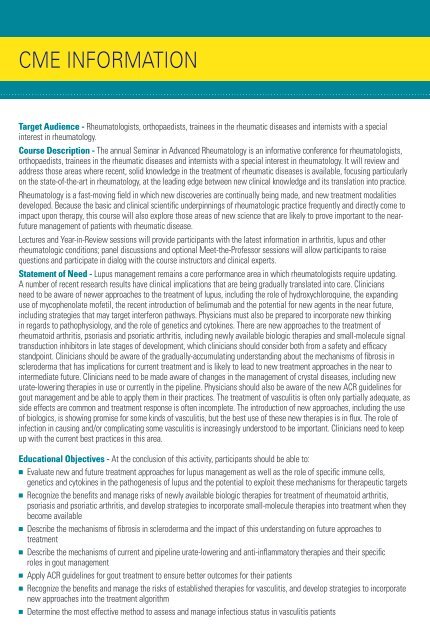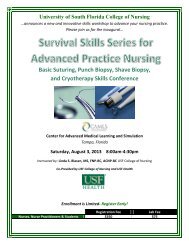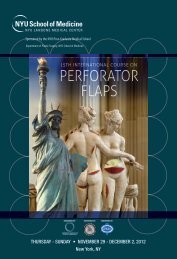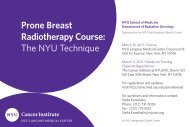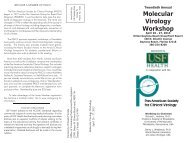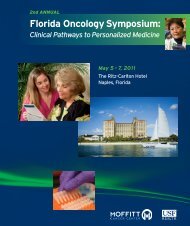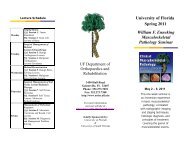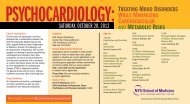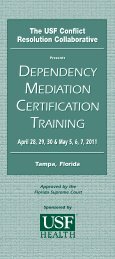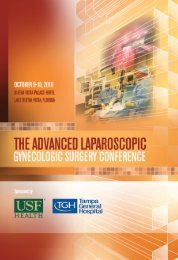ADVANCED RHEUMATOLOGY
ADVANCED RHEUMATOLOGY
ADVANCED RHEUMATOLOGY
Create successful ePaper yourself
Turn your PDF publications into a flip-book with our unique Google optimized e-Paper software.
CME INFORMATION<br />
Target Audience - Rheumatologists, orthopaedists, trainees in the rheumatic diseases and internists with a special<br />
interest in rheumatology.<br />
Course Description - The annual Seminar in Advanced Rheumatology is an informative conference for rheumatologists,<br />
orthopaedists, trainees in the rheumatic diseases and internists with a special interest in rheumatology. It will review and<br />
address those areas where recent, solid knowledge in the treatment of rheumatic diseases is available, focusing particularly<br />
on the state-of-the-art in rheumatology, at the leading edge between new clinical knowledge and its translation into practice.<br />
Rheumatology is a fast-moving field in which new discoveries are continually being made, and new treatment modalities<br />
developed. Because the basic and clinical scientific underpinnings of rheumatologic practice frequently and directly come to<br />
impact upon therapy, this course will also explore those areas of new science that are likely to prove important to the nearfuture<br />
management of patients with rheumatic disease.<br />
Lectures and Year-in-Review sessions will provide participants with the latest information in arthritis, lupus and other<br />
rheumatologic conditions; panel discussions and optional Meet-the-Professor sessions will allow participants to raise<br />
questions and participate in dialog with the course instructors and clinical experts.<br />
Statement of Need - Lupus management remains a core performance area in which rheumatologists require updating.<br />
A number of recent research results have clinical implications that are being gradually translated into care. Clinicians<br />
need to be aware of newer approaches to the treatment of lupus, including the role of hydroxychloroquine, the expanding<br />
use of mycophenolate mofetil, the recent introduction of belimumab and the potential for new agents in the near future,<br />
including strategies that may target interferon pathways. Physicians must also be prepared to incorporate new thinking<br />
in regards to pathophysiology, and the role of genetics and cytokines. There are new approaches to the treatment of<br />
rheumatoid arthritis, psoriasis and psoriatic arthritis, including newly available biologic therapies and small-molecule signal<br />
transduction inhibitors in late stages of development, which clinicians should consider both from a safety and efficacy<br />
standpoint. Clinicians should be aware of the gradually-accumulating understanding about the mechanisms of fibrosis in<br />
scleroderma that has implications for current treatment and is likely to lead to new treatment approaches in the near to<br />
intermediate future. Clinicians need to be made aware of changes in the management of crystal diseases, including new<br />
urate-lowering therapies in use or currently in the pipeline. Physicians should also be aware of the new ACR guidelines for<br />
gout management and be able to apply them in their practices. The treatment of vasculitis is often only partially adequate, as<br />
side effects are common and treatment response is often incomplete. The introduction of new approaches, including the use<br />
of biologics, is showing promise for some kinds of vasculitis, but the best use of these new therapies is in flux. The role of<br />
infection in causing and/or complicating some vasculitis is increasingly understood to be important. Clinicians need to keep<br />
up with the current best practices in this area.<br />
Educational Objectives - At the conclusion of this activity, participants should be able to:<br />
n Evaluate new and future treatment approaches for lupus management as well as the role of specific immune cells,<br />
genetics and cytokines in the pathogenesis of lupus and the potential to exploit these mechanisms for therapeutic targets<br />
n Recognize the benefits and manage risks of newly available biologic therapies for treatment of rheumatoid arthritis,<br />
psoriasis and psoriatic arthritis, and develop strategies to incorporate small-molecule therapies into treatment when they<br />
become available<br />
n Describe the mechanisms of fibrosis in scleroderma and the impact of this understanding on future approaches to<br />
treatment<br />
n Describe the mechanisms of current and pipeline urate-lowering and anti-inflammatory therapies and their specific<br />
roles in gout management<br />
n Apply ACR guidelines for gout treatment to ensure better outcomes for their patients<br />
n Recognize the benefits and manage the risks of established therapies for vasculitis, and develop strategies to incorporate<br />
new approaches into the treatment algorithm<br />
n Determine the most effective method to assess and manage infectious status in vasculitis patients


